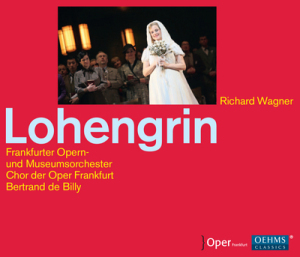What does one do with a live performance of Lohengrin in which there’s nothing actually wrong, but nonetheless fades seconds after you’ve heard it? I’ve listened to this set three times–I adore the opera and always look forward to a new recording or DVD–and am bored silly by it. The Frankfurt Opern-und Museums-orchester and the Frankfurt Opera Chorus have certainly proved themselves superb in their Ring Cycle under Sebastian Weigle, with Oehms’ sound incapable of being any better balanced or honest, and the same is true here. Furthermore, much of the singing in this Lohengrin is quite good. And it’s duller than dirt.
I’m not merely comparing it to the amazing, 1964 Rudolf Kempe-led version on EMI or even Semyon Bychkov’s five-year-old version from Cologne (Profil), both of which are brilliant. Listened to in a vacuum, the Frankfurt performance is somehow ineffective; Bertrand de Billy’s leadership is devoid of both excitement and tension. This opera requires a sense of wonder: Look! A white knight on a swan boat is approaching! Listen! He’s making her promise not to ask about his background! Who will win the duel? How will Ortrud convince Elsa to betray her promise? Listen! The creepy intro to Act 2 foretells evil! Yawn.
The Prelude is lovely enough but never reaches that gorgeous silver-blue-light effect it sometimes can. I missed the rise and fall it should have as well, despite the stunning low brass. Daniel Schmutzhard’s Herald impresses instantly and continues to do so throughout the performance. Falk Struckmann, fine artist though he is, sounds a bit frayed as King Heinrich at first but by late in Act 1 he is majestic. (This is taken from a series of live performances.)
Robert Hayward, a baritone previously unknown to me, is an okay Telramund, but that simply isn’t good enough. He sings intelligently and with attention to the text, but he often sounds as if he’s at the end of his vocal tether. Telramund is a tough role–he’s weak, then terrified, then fierce–but his virulent eruption in the first scene of Act 2 should stun, and here it just sounds loud. He’s best when he cowers. If you listen to Fischer-Dieskau under Kempe you’ll shudder in your boots.
Michaela Schuster does everything right and she never strains–quite a feat, particularly in her two maniacal outbursts–and her quiet, insinuating singing, both to Telramund, and minutes later, to Elsa, is very effective. But the voice itself–and I realize how subjective this statement is–is not unique. Think about the competition: Astrid Varnay (with Keilberth on Decca, from 1953); Christa Ludwig (Kempe, again, singing with an audible sneer); Gwyneth Jones (under Kubelik, on DG, sounding insane). Schuster, with her lighter tone, fine singer that she is, really doesn’t have a chance. When any of the first three interrupt with “Züruck, Elsa” you feel the disruption. Maybe it’s de Billy’s leadership that turns the moment ordinary on this recording, but believe me, it’s not nearly as upsetting as usual.
And now to the happy couple: What a wonderful singer is Camilla Nylund! But she sounds worldly rather than trancelike and fragile at the start, lacks the happy/nervous anticipation of say, Jessye Norman (Solti/DG), or Elisabeth Grümmer (Kempe) as she awaits her knight–and how disappointing is her high A on the word “Erlöser!”. Her firm tone and secure delivery are a joy in the big Act 2 ensembles, but she never wins our hearts. Elsa is a conundrum–penetrating but refined–and Nylund misses both by a hair.
As for the Lohengrin of Michael König, just let me start with his warning to Elsa in Act 1. Both times he issues the warning as if he’s ordering from a menu: matter-of-factly, with no dire emphasis at all. He’s always audible and in tune, but his sound is generic and his way with dynamics is clumsy (“look at me, I’m singing softly!”). The Bridal Chamber Scene lacks the intimacy it absolutely requires, and his Narration, which really should do the aural equivalent of glowing in the dark, is mundane, notwithstanding every note in place, some attacked sweetly. Jess Thomas (Kempe), Placido Domingo (Solti), and others get the combination of gallantry and compassion just right; König does not.
As mentioned above, I lay much blame at the feet of Bertrand de Billy. The last half hour of Act 2 seems endless and a collection of events rather than one long, tense scene; and while all of the grand moments–the duel, the big choruses, the prelude to Act 3–are well played, this set never sounds spontaneous. The sad chorus after Lohengrin’s Narrative is another straight-thinking event. If you own the Kempe, it’s all you need. This one never quite misrepresents the work, but it doesn’t quite get it, either.
































